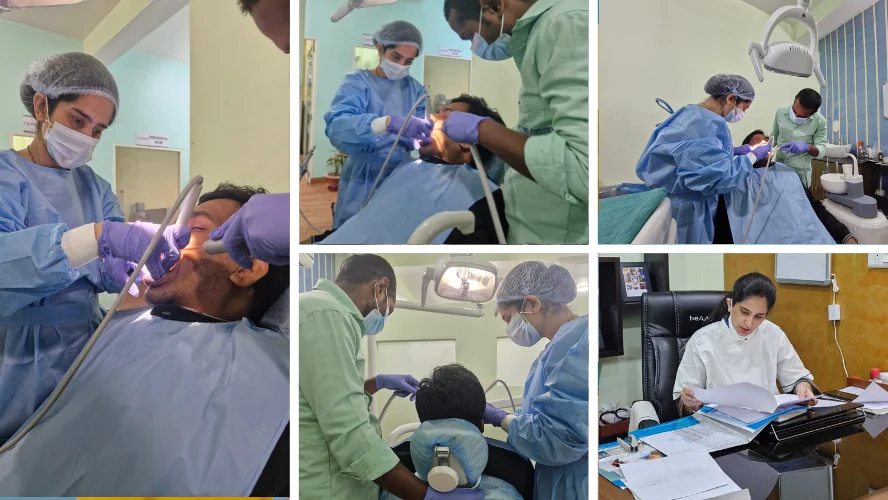
Root canal treatment (RCT) is a successful dental procedure for preserving teeth that have become decayed or infected. The procedure consists of removing contaminated pulp tissue, followed by canal disinfection. Additionally, the dentist also seals the tooth to stop future infections at the end of this procedure.
Root canal is a useful treatment with a high success rate, but sometimes it results in failure too. A failed root canal can lead to further discomfort for the patient. That’s why it’s crucial to address this issue as quickly as possible.
However, to get quick professional attention, it’s important for the patient to know the signs of a failed root canal procedure.
At Dr. Aishwarya, B.D.S., M.D.S. (Gold Medalist), we provide a safe and effective root canal treatment in Patna. We combine modern dentistry with compassionate care to achieve better and faster results. Additionally, we also treat our patients at reasonable prices. So, book an appointment now to get an affordable and successful RCT in Patna.
Meanwhile, we’ll tell you what causes the failure of RCT.
What Causes the Failure of RCT?
Multiple factors result in root canal failure, primarily because of inadequate cleaning and sealing or bacterial reinfection. Here are the most frequent and common causes of RCT failure:
1. Incomplete Removal of Infection
During dental procedures, the dentist might fail to properly clean intricate root canal structures, which allows infected tissue to remain inside. This left-out infected tissue causes the infection after root canal procedure to recur and leads to the failure of RCT.
2. Improper Sealing of the Canal
In a few cases, the dentist is not able to seal the root canal properly, which allows bacteria to penetrate inside the tooth. This causes reinfection that leads to swelling or discomfort, or pus formation, and it is considered nothing more than failure.
3. Missed Canals
Molar teeth possess several canals inside them. A failed infection can occur when any one of the canals remains untreated after the procedure because it was overlooked. This will eventually lead to treatment failure.
4. Fractured or Damaged Tooth
After root canal treatment, the tooth remains at risk because cracks or fractures create openings for bacteria to enter and threaten the treatment’s success.
5. Delay in Placing Crown
Root canal treatment requires an immediate dental crown installation for tooth protection. The duration of delay before crown placement causes tooth structure, which creates conditions for contamination to occur.
So, these were the causes of root canal failure, and as you can see, 4 of the 5 causes are linked to improper root canal procedure by a dentist. That is why it is always advised to choose a well-experienced dentist for the RCT procedure.
Additionally, as we have also discussed earlier, being aware of the common signs of a failed root canal procedure is also very crucial, as it helps to get the right treatment early. So, in the next section, we are going to signs of a failed root canal.
Signs and Symptoms of a Failed Root Canal

Early recognition of failed root canal symptoms helps get quick medical intervention, which prevents the development of severe complications. Here are signs you must look for:
1. Persistent Pain or Discomfort
Feeling pain after the root canal treatment is pretty common, as it’s a part of the healing process. But discomfort should not persist for several weeks or intensify because such symptoms often indicate infection development. So, if your pain and discomfort are worsening day by day, then get in touch with a dentist right now.
2. Swelling and Tenderness
Swelling in the area surrounding the treated tooth and its gums and jaw tissue indicates post-root canal infection. When this condition develops, then redness, together with sensitivity, appears in the affected region and persists for more than a week.
3. Pimple or Abscess on the Gums
A pimple or boil that recurs near the treated tooth on the gums represents a definitive sign that the root canal treatment has failed. The condition produces pus which exits through a drainage point while emitting a foul odor and tasting unpleasant.
4. Tooth Discoloration
A dark or greyish discoloration of the treated tooth suggests incomplete pulp removal during the procedure. It happens because of the development of decay inside the tooth. To fix this, the dentist may have to go for the Re-RCT procedure.
5. Sensitivity to Pressure or Biting
Some patients experience sensitivity after the procedure, but it goes away after a few days. However, if the pain or sensitivity while biting or chewing persists for more than a week, it may be a symptom of a failed root canal.
6. Fever or General Ill-Feeling
When infections spread past the tooth boundaries, patients might develop systemic symptoms, including fever and fatigue, together with swollen lymph nodes. If this happens, run to the dentist right away. You should visit the leading dental clinic in Patna for a complete assessment of this issue and stop the infection from spreading further in the body.
Some of these were the common signs and symptoms of RCT failure. If you are experiencing any one of these after your root canal procedure, then get in touch with a good dental clinic as soon as possible to get the right treatment.
The diagnosis of root canal failure through clinical evaluation and radiographic testing leads the dentist to choose appropriate solutions for failed RCTs. The following treatments represent potential choices for patients.
Treatment Options for A Failed RCT
A professional dental expert makes a diagnosis of root canal failure through clinical evaluation and radiographic testing. This helps the dentist choose appropriate solutions for your failed RCT. The treatments may include:
1. Re-RCT
It’s a standard treatment approach that requires tooth re-opening and old filling removal before a complete canal disinfection, followed by proper sealing of the canals. Experienced endodontists achieve successful outcomes through this procedure.
2. Apicoectomy (Root-End Surgery)
A patient who needs either retreatment or whose retreatment does not succeed may require an apicoectomy as a treatment option. In this procedure, a specialist removes root tips before applying a seal to prevent future infections at the root end.
3. Tooth Extraction and Replacement
Extraction of the tooth becomes necessary when both the RCT and Re-RCT procedures are unable to save the tooth. After the extraction, the dental practitioner replaces the missing tooth using a dental implant, bridge, or denture to fill the gap.
So, if you wish to get the right treatment after your RCT failure, visit Dr. Aishwarya, B.D.S., M.D.S. (Gold Medalist). We provide state-of-the-art treatment options for failed RCTs with individualized care and accurate diagnostics. Additionally, we also provide single-seating root canal treatment to minimize the chances of failure.
The Role of Single-Sitting RCT in Preventing Failure
Single-Sitting RCT in Patna is a preferred procedure for patients and dentists because of its modern dental technology. The following are some of the advantages of single-sitting root canal treatment to reduce the chances of failure:
- Reduced Risk of Contamination – Since the procedure is done in one visit, the risk of bacterial contamination in the tooth is eliminated.
- Enhanced Patient Comfort – In this approach, the need for multiple injections and appointments is eliminated, which makes the patient more comfortable and convenient.
- Efficient Use of Technology – The use of rotary endodontics, apex locators, and digital X-rays, among other tools, assists in the completion of the procedure with precision, hence better results.
- Ideal for Busy Patients – It is beneficial especially for busy professionals, students, and elderly people who may find it difficult to visit the clinic several times.
Dr. Aishwarya, B.D.S., M.D.S. (Gold Medalist), has done several successful sessions of Root Canal Treatments in Patna with the help of modern instruments and techniques. She ensures the comfort of the patients and the lowest failure rate.
Why Choose Dr. Aishwarya – The Best Dental Clinic in Patna
If you are having post-RCT problems or want preventive treatment, then Dr. Aishwarya, B.D.S., M.D.S. (Gold Medalist) dental clinic is the best place for you. Regional folks consider us the best dental clinic in Patna because:
- Experienced and well-qualified experts: Dr. Aishwarya, with her gold medal in M.D.S., is the one who has academic and clinical experience in treating every case.
- Cutting Edge Technology – We make use of modern endodontic systems and imaging tools in order to diagnose and treat the most complex root canal problems with precision.
- Patient-Centric Care –From consultation to post-treatment care, our focus is on the comfort, education, and oral health of the patient.
- Hygiene & Safety: We have the highest standards of sterilization and hygiene to ensure that treatment is safe.
Apart from that, we also provide every patient with personalized care that is tailored to their specific needs. That’s why people around Patna and neighbouring districts come to our clinic to get quality treatment, that too at affordable prices.
Conclusion
A root canal failure can be distressing, but it is treatable, especially when it is identified early. That’s why in this blog, we have talked about the signs of a failed root canal procedure, which include persistent pain, swelling, and abscesses.
Remember not to ignore any post-RCT discomfort that you feel, as it may lead to a more severe issue. Try to get in touch with an expert dentist ASAP because early treatment will help prevent further complications.
For consultation and treatment options for failed RCT, visit Dr. Aishwarya, B.D.S., M.D.S. (Gold Medalist).
Whether you need re-treatment or you want to prevent failure with single sitting root canal treatment, we are here to help you. Book Your Appointment to smile with confidence again.


